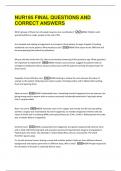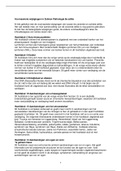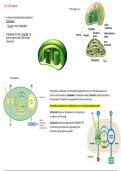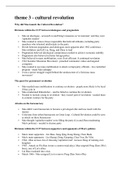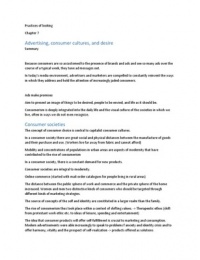Lecture Assignment 5 – Emotion & Emotion Regulation
-----
1. In the lecture the Process Model of James Gross is discussed.
1A. What is the difference between antecedent- and response-focused emotion regulation?
[1 point]
→ Two different types of strategies:
1. Antecedent- related emotion regulation
o Refer to everything we do before response tendencies have become fully activated and
before they have affected our behaviour and our physiology.
2. Response- related emotion regulation
o Refer to everything we do after response tendencies have arrived, so after a emotional
response tendencies have become fully activated.
So, the difference between these two strategies is that the first one is present before the emotional response
tendencies (ERT). While the second strategy presents itself when the ERT are fully activated. So the time it
occurs is the difference.
1B. Cognitive reappraisal and suppression have different consequences according to this
model. What are the different cognitive (memory)-related differences between reappraisal
and suppression? [1 point]
→ In the memory task it was found that a reappraisal didn’t have any costs. It didn’t have any impact on
memory while in the suppression condition it had costs for memory. The participants were able to remember
less details and had a worse verbal memory in comparison to the reappraisal condition.
Additive information:
So, both, reappraisal and suppression have different effects.
Cognitive reappraisal is an antecedent focused strategy, and it relates to a reappraisal of an emotion
triggering situation as to decrease the emotional impact. It helps to neutralize the emotion.
Suppression is a response focused strategy. So for example when all the emotions are full blown presence, you
try to suppress the emotion, so for example you take a brave face when nervous, so nobody notice.
2. In the lecture the Online Emotion Regulation Model of Sheppes and Meiran is discussed.
2A. Based on this model emotion regulation is investigated once when the emotion is full-
blown present. Distraction and reappraisal have different consequences according to this
model. What are the different cognitive (memory)-related differences between distraction
and reappraisal? [1 point]
→ Reappraisal giving attention to the emotional situation but changing the interpretation in a neutral one
while distraction is getting attention to neutral thoughts. So, the emotional meaning will decrease.
Memory- related: it was found that before (pre-regulation) the regulation instructions there was no difference
between the reappraisal and distraction condition. But when the instructions where inserted (regulation) and
the participants in both conditions started applying their emotions differently, the research showed that the
reappraisal had a significant higher proportion of correct answers in comparison to the distraction condition.
So, a late reappraisal involves attending to the emotional situation, so it seems to leave the memory intact,
but is seems to consume self-control resources.
-----
1. In the lecture the Process Model of James Gross is discussed.
1A. What is the difference between antecedent- and response-focused emotion regulation?
[1 point]
→ Two different types of strategies:
1. Antecedent- related emotion regulation
o Refer to everything we do before response tendencies have become fully activated and
before they have affected our behaviour and our physiology.
2. Response- related emotion regulation
o Refer to everything we do after response tendencies have arrived, so after a emotional
response tendencies have become fully activated.
So, the difference between these two strategies is that the first one is present before the emotional response
tendencies (ERT). While the second strategy presents itself when the ERT are fully activated. So the time it
occurs is the difference.
1B. Cognitive reappraisal and suppression have different consequences according to this
model. What are the different cognitive (memory)-related differences between reappraisal
and suppression? [1 point]
→ In the memory task it was found that a reappraisal didn’t have any costs. It didn’t have any impact on
memory while in the suppression condition it had costs for memory. The participants were able to remember
less details and had a worse verbal memory in comparison to the reappraisal condition.
Additive information:
So, both, reappraisal and suppression have different effects.
Cognitive reappraisal is an antecedent focused strategy, and it relates to a reappraisal of an emotion
triggering situation as to decrease the emotional impact. It helps to neutralize the emotion.
Suppression is a response focused strategy. So for example when all the emotions are full blown presence, you
try to suppress the emotion, so for example you take a brave face when nervous, so nobody notice.
2. In the lecture the Online Emotion Regulation Model of Sheppes and Meiran is discussed.
2A. Based on this model emotion regulation is investigated once when the emotion is full-
blown present. Distraction and reappraisal have different consequences according to this
model. What are the different cognitive (memory)-related differences between distraction
and reappraisal? [1 point]
→ Reappraisal giving attention to the emotional situation but changing the interpretation in a neutral one
while distraction is getting attention to neutral thoughts. So, the emotional meaning will decrease.
Memory- related: it was found that before (pre-regulation) the regulation instructions there was no difference
between the reappraisal and distraction condition. But when the instructions where inserted (regulation) and
the participants in both conditions started applying their emotions differently, the research showed that the
reappraisal had a significant higher proportion of correct answers in comparison to the distraction condition.
So, a late reappraisal involves attending to the emotional situation, so it seems to leave the memory intact,
but is seems to consume self-control resources.


